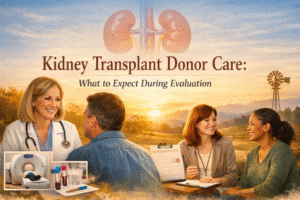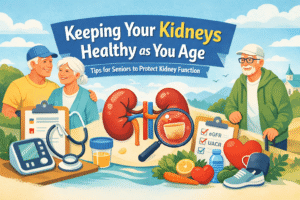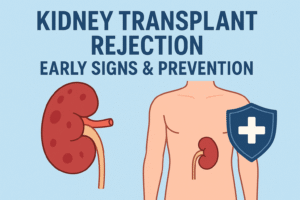Knowing the rare kidney diseases may seem like entering a maze. You are likely to hear the names flying around the place: Alport syndrome, Fabry disease, polycystic kidney disease, the list is endless. What does it really mean to the patients and their families? One by one, piece by piece, unravel it.
What Makes a Kidney Disease “Rare” and How Common Are Genetic Causes?
A rare kidney disease is also not merely a weird diagnosis, but it is characterized by a very low number of cases per population. Imagine that it is a needle in a haystack; medical professionals might only see a few in their lifetime. A lot of these conditions are associated with genetics. That is because of some mutations in your family history, something inherited. This association may be important in deciding early life care and lifestyle changes.
Which Are the Most Common Rare Genetic Kidney Disorders Patients Should Know?
There are some recurrent names in research and stories of patients. Rare kidney diseases like PKD lead to the development of fluid cysts, whereas Alport syndrome affects the receptive units of the kidneys as well as hearing in some cases. Fabry disease, cystinosis, and nephronophthisis are even more unusual and yet to be noted. It is not just trivial to know these names so that you can direct early testing, treatment choices, and talk with your healthcare team. Our team at SouthernOKC is here to guide you.
How Do Doctors Diagnose Rare Kidney Diseases and Genetic Disorders?
It is overwhelming when making a diagnosis. It typically begins with a combination of symptoms, family history, and laboratory findings. Doctors may also prescribe imaging examinations, kidney functioning tests, and even genetic examinations. It can take a long time, some of it can be irritating, but it is important. Early diagnosis usually determines the course of action and the overall quality of life; thus, staying active is vital.
What Treatment and Management Options Are Available for Patients?
There is no universal treatment for rare kidney diseases. There are those patients who require medication to control some symptoms, and some patients will require dialysis or a kidney transplant. Surprisingly, lifestyle changes, such as diet changes, hydration, and blood pressure, have an important impact. New targeted therapies are giving some hope to some ailments, and research continues to develop. It is not only about survival but also about living better, day by day.
Why Is Genetic Counseling Important for Families Facing Kidney Disorders?
Genetic counseling may seem to be a safety net. Counselors assist families in recognizing the risks, testing options, and the future. It is also related to emotional support- having inherited risks can be burdensome. Discussing family planning and possible results makes the patients and their families clear and even peaceful.
How Can Patients Access Support, Research, and Advocacy Resources?
Assistance does not necessarily stay within the doctor’s offices. Education programs like the ones offered by patient advocacy groups, clinical trials, research centers, community networks, and access to state-of-the-art studies are available. Patients and families can be empowered by knowing where to go to get information that they can rely on. Relating to people who have shared the same journey is usually accompanied by useful advice and a pleasant surprise.
What Steps Can Patients Take to Monitor and Protect Their Kidney Health?
Rare kidney disease health monitoring is a daily routine. Kidney function tests, early detection of changes, and screening done regularly can help monitor the progress. The change in lifestyles, hydration, physical activity, and avoiding toxins contribute to the general functioning of the kidneys. And when confused, it is never wrong to consult professionals. To be comprehensive, refer to Kidney Disease Care & Prevention. A great foundation of preventive treatment.
For families dealing with rare kidney problems, SouthernOKC is a steady resource. Their team takes time to explain genetic risks and guide patients toward treatment options that fit real life.




